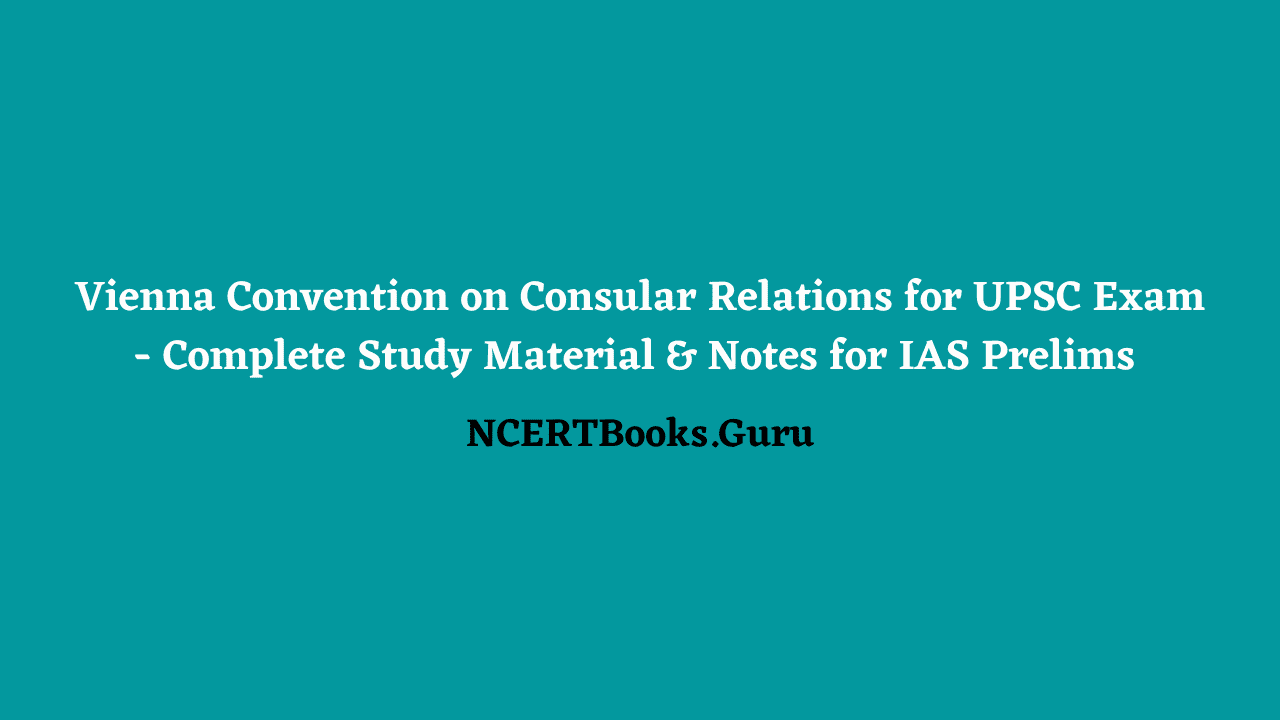Vienna Convention on Consular Relations is an international treaty that defines the framework for Consular Relation between the Sovereign States. It began in the year 1963 and counsel performs two functions namely protecting the interests of countrymen in the host country and maintaining the relations between two states. Immunity given to Consular is similar to Diplomat and treaty is ratified by 179 states.
In this article, you will learn all about the Vienna Convention on Consular Relations for UPSC Exam. Use them as a reference and answer all the questions framed on the topic in your IAS Prelims. Score better grades in the UPSC Civil Service Examination by getting a good hold of the concept.
Protection of Consular Premises
- Receiving State in the case of Armed Conflict need to respect and protect the Consular Premises taking the help of Consular Post and Consular Archives.
- On the Other hand, the Sending State can entrust the custody of Consular Premises along with Property within and Consular Archives to a third State that is accepted by Receiving State.
- Sending State can entrust the Protection of its Interests and those of its Nationals to a third State that is accepted by the Receiving State.
Person Declared Non Grata
Receiving State can notify the Sending State at any time that a Consular Officer or any Other Member of the Consular Staff is not Acceptable. In Such a Scenario the Sending State can either recall the Person Concerned or Terminate the Functions with Consular Post.
If at all the Sending State refuses or fails to recall the Person within a specified time the receiving State can either withdraw the exequatur from the concerned person or stop him as a member of consular staff.
Do Refer More Articles:
- India Outline Map
- Malimath Committee Report
- List of NCERT Books for IAS UPSC Exams
- UPSC OMR Sheet PDF
Vienna Convention Consular Functions
- Article 5 of the Convention defines the Consular Functions.
- The Convention has to protect in the receiving state the interests of sending state and its nationals as per the limits permitted by international law.
- It is responsible for furthering the development of economic, cultural, commercial, and scientific relations between both the Sending and Receiving States.
- Issues Passports and Travel Documents, Visas, etc. to the Sending State nationals who wish to travel to Sending State.
- Ascertaining by all lawful means conditions and developments in the economic, cultural, commercial, and scientific life of the receiving State.
- Subject to the practices and procedures obtaining in the receiving State, representing or arranging appropriate representation for nationals of the sending State before the tribunals and other authorities of the receiving State.
Facilities, Privileges, and Immunities of the Vienna Convention
- Sending State has all the rights to use its national flag and coat of arms in the Receiving State.
- Receiving State Authorities shouldn’t enter the Consular Premises Part that is exclusively used for purpose of work of the consular post. And has to move only with the consent of the consular post head.
- The receiving State needs to take all the necessary steps for protecting the consular premises against any damage or intrusion.
- Receiving State has to permit and protect freedom of communication on consular post region for all the official purposes needed.
- Consular Officers are free to communicate with Sending State Nationals and to access them.
- Competent Authorities of Receiving State should inform the Consular Post of the Sending State if a national is arrested or in a Custody pending trial or detained in any other manner.
Wrapping Up
We wish the knowledge shared regarding the Vienna Convention on Consular Relations has shed some light on you. If you still have any queries do leave us your queries via the comment section so that we can get back to you at the earliest possibility. Keep connected to our site to avail latest updates on UPSC Exam Preparation Related Stuff in no time.
